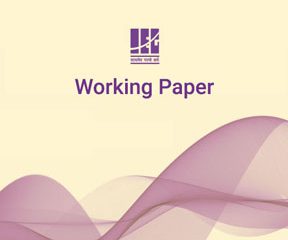
COVID lockdown, how people managed and impact of welfare schemes on informal sector workers: Evidence from Delhi slums
Working Paper No- 409
COVID-19 pandemic is likely to accentuate poverty and vulnerability of people at the margin for a number of reasons like lockdown, relocation to native places having no scope for gainful employment, health effects, opening of work with many restrictions, future uncertainty, etc. Following the lockdown in March, the central and state governments announced many welfare measures like direct cash transfer, food grain distribution through public distribution system, community kitchen and many others to reduce the negative effect of the lockdown and provide some basic minimum income to the poorer class, though the effects are yet to be assessed. This paper studies 199 slum households in Zakhira and Kirti Nagar areas of Delhi during April-May 2020 to find out their coping and the benefits they received from these welfare schemes. Sample consisted of people like wage labour, e-rickshaw drivers, auto drivers, people doing small private jobs, street vendors, construction workers, etc. The results show the households to have consumed 2.5 meals per day and have used up their savings or have borrowed from friends. The welfare schemes were marginally helpful. Only 76% of the households were benefited by at least one of the nine schemes announced by the government and the average gain was a meagre Rs984/ per household, with an average family size of 5.8 persons, for one lockdown month. Maximum could not take advantage of the schemes either because they were unaware or did not possess their specific social security entitlement identification documents like ration card, adhar card, job card, vehicle papers, etc. If all eligible households had their social security documents, the average monetary benefit would have been Rs2251/ per households per month, nearly 2.3 times more and the benefits distribution would have been fairer, which highlights the importance of such documents in reducing the vulnerability of poor people.
Find on this page
Contact Us
Institute of Economic Growth, University Enclave, University of Delhi (North Campus),
Delhi 110 007, India
contact-us@iegindia.org
+91-11-27666364/6367, 27667101/7288/7365/7424
+91-11-27667410


